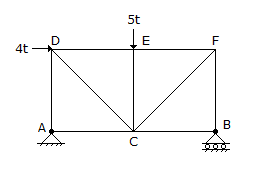Discussion
Home ‣ Civil Engineering ‣ Surveying See What Others Are Saying!
- Question
If whole circle bearing of a line is 120°, its reduced bearing is
Options- A. S 20° E
- B. S 60° E
- C. N 120° E
- D. N 60° E.
- Correct Answer
- S 60° E
- 1. A linear relationship is observed between speed and density on a certain section of a highway. The free flow speed is observed to be 80 km per hour and the jam density is estimated as 100 vehicles per km length. Based on the above relationship, the maximum flow expected on this section and the speed at the maximum flow will respectively be
Options- A. 8000 vehicles per hour and 80 km per hour
- B. 8000 vehicles per hour and 25 km per hour
- C. 2000 vehicles per hour and 80 km per hour
- D. 2000 vehicles per hour and 40 km per hour Discuss
- 2. If the effective length of a 32 cm diameter R.C.C. column is 4.40 m, its slenderness ratio, is
Options- A. 40
- B. 45
- C. 50
- D. 55
- E. 60 Discuss
- 3. Specific weight of liquid
Options- A. remains constant at every place
- B. does not remain constant at every place
- C. varies from place to place on the earth
- D. does not vary on any other planet. Discuss
- 4. The weight of 1 m3 of brick earth, is about
Options- A. 1200 kg
- B. 1500 kg
- C. 1800 kg
- D. 2000 kg. Discuss
- 5. If the flame of a miner's safety lamp in a manhole extinguishes within 5 minutes, the sewer certainly contains
Options- A. Hydrogen sulphide
- B. Carbon dioxide
- C. Methane
- D. Oxygen
- E. None of these. Discuss
- 6. For large vessels, the buoys are strengthened by connecting it to a number of anchors having
Options- A. one legged mooring
- B. two legged mooring
- C. three legged mooring
- D. four legged mooring
- E. all the types as above. Discuss
- 7. If tensile stress of a steel rod of diameter D is 1400 kg/cm2 and bond stress is 6 kg/cm2, the required bond length of the rod is
Options- A. 30 D
- B. 40 D
- C. 50 D
- D. 53 D
- E. 59 D Discuss
- 8. The force in BF of the truss shown in given figure, is

Options- A. 4t tension
- B. 4t compression
- C. 4.5t tension
- D. 4.5t compression
- E. zero. Discuss
- 9. If the flame of a miner's safety lamp in the upper layers of the sewer forms an explosive, the sewer certainly contains
Options- A. Hydrogen sulphide
- B. Carbon dioxide
- C. Methane
- D. Oxygen
- E. None of these. Discuss
- 10. The formula for pipe flows, suggested by, Hazen-William is
Options- A.

- B. V = 0.85 CH R0.63 . S0.54
- C.

- D. None of these. Discuss
More questions
Correct Answer: 2000 vehicles per hour and 40 km per hour
Correct Answer: 55
Correct Answer: does not vary on any other planet.
Correct Answer: 1800 kg
Correct Answer: Carbon dioxide
Correct Answer: all the types as above.
Correct Answer: 59 D
Correct Answer: 4.5t compression
Correct Answer: Methane
Correct Answer: V = 0.85 CH R0.63 . S0.54
Comments
There are no comments.More in Civil Engineering:
Programming
Copyright ©CuriousTab. All rights reserved.
